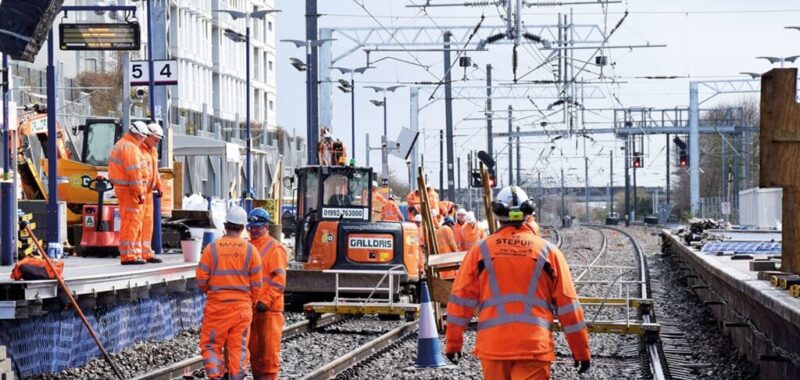Industry figures have warned that too little rail work is flowing through to suppliers, with grave potential consequences for jobs, delivery and safety.
Dissatisfaction with spending through Network Rail’s Control Period 7 (CP7) has overflowed in a series of posts on social media.
It comes after engineering services giant Renew last month blamed rail project delays for lower-than-expected profit levels, while tools and equipment firm Speedy Hire said in a trading statement earlier this month that a “delay in CP7 rail works” had impacted its business.
Tim Samuel, managing director of Crewe-based signalling specialist Mosaic Rail, said on LinkedIn last week that these were “extremely concerning times” for the industry.
“Redundancies [are] being made across all sectors, which is ridiculous considering the supposed workload to be managed in this now-fictional control period,” he said.
“This sort of boom and bust is precisely why the UK lacks the technical skills and productivity seen across the globe to fight downturn. This government talks about growth daily, yet shackles our industry with [its] incompetence and indecision, preventing any such expansion.”
Russell Simpson, director at West Midlands-based signalling specialists DigiSig Rail, decried delays in “much-needed CP7 spending”.
“Patch and mend is not happening as it should, and funding is not forthcoming, creating additional pressures on maintenance teams,” he added. “Redundancies are happening across the industry and valuable skills are being lost.”
Simpson warned that when “CP7 finally comes to life” there may be “nobody left in the industry to do the work”. He added that in a “significantly worse scenario” there could be “a major infrastructure-related disaster on the horizon”.
“Without urgent intervention, the risks to both safety and the long-term viability of our railway network will only grow.”
Sisk rail director Carl Hendry replied to Samuel’s comment noting that the “number and depth of comments” on LinkedIn from “very influential people” showed that the issue of CP7 spending was “a serious concern across all aspects of the railway delivery family”.
Richard Watts, rail director at Bam Nuttall – one of the major contractors working for Network Rail – told Construction News that a slow start to the control period had been compounded by other issues.
“As a leading CP7 partner, Bam is working really closely with Network Rail across a number of frameworks and major projects nationally to help find value engineering solutions to the funding and efficiency challenges faced,” he said.
“Historically, the start of control periods have often been slow to get going and CP7 seems to be no exception, but this has been compounded further by affordability and funding challenges for the industry.
“However, the renewal and modernisation of our railway infrastructure has never been more crucial and we’re confident that we’ll see movement soon as investment priorities are finalised by the Network Rail routes and their budgets released.”
He added: “The key consideration for Network Rail is that all the work needs to be delivered while adopting cost-efficient solutions to tackle the challenges the industry faces such as climate resilience and the life extension of existing assets, but crucially at reduced unit rates.
“That’s something that Bam has reshaped our business to deliver.”
CP7 started on 1 April last year and runs until the end of March 2029. Network Rail has promised to spend more than £45bn in the period, to boost safety, reliability and other metrics.
But regulator the Office of Road and Rail warned of “mounting pressures on CP7 funding” in its annual financial efficiency report, published last October.
A Network Rail spokesperson said: “The start of CP7 has seen higher activity and spending compared to the beginning of CP6, though not yet at CP6’s peak levels.”
The spokesperson added that the government-owned company was transparent about its CP6 spending profile and its impact on the supply chain.
“As an industry, we have significant improvements to make in train performance, which we are balancing along with enhancement and renewal works. We remain committed to working closely with our suppliers in CP7 and maintaining as much transparency as possible going forward,” they said.

